#nemuro mikage
Note
I am know this is an insanity broad question but do you have any specific thoughts on Revolutionary Girl Utena? or anything that you think hasn’t been said or just caught your attention? Your one of my favorite meta writers and I’ve been reading your blog since you were doing semi-regular AOT meta, so I guess I should have figured you had seen the series—RGU is a show so dense symbolism, metaphor, ect.—there was just so much to pick apart. Anyway, I would love to hear anything you had to say abt the series!

Sure, I've always wanted to do a meta on the Black Rose arc which is a totally underrated arc. I feel part of the reason it's not as discussed as other arcs is from a lack of understanding of it's role in the story.
The Black Rose arc is a moon arc.
You've heard of the hero's journey, now it's time to learn about the fool's journey. In Tarot, The Fool's Journey is a journey to self fulfillment where each of the 22 major arcana represent a stage on that journey - an experience that a person must incorporate to become whole.
The fool begins their journey at (0), fresh as a newborn, naive and unaware to the world. The fool is strangely empty, as is zero. Who better to serve as our analogue for the fool then the main character Utena Tenjou, characterized by 1) her naivete and 2) her emptiness.
Several years after losing her parents she lost the will to keep on living. Desperately in search for a reason to live a prince appeared before her and gave her one, showing her something eternal, and leaving with her a ring to lead her to him one day. That was all very well and good, but so impressed was she by the prince, that the princess made up her mind to become a prince herself!
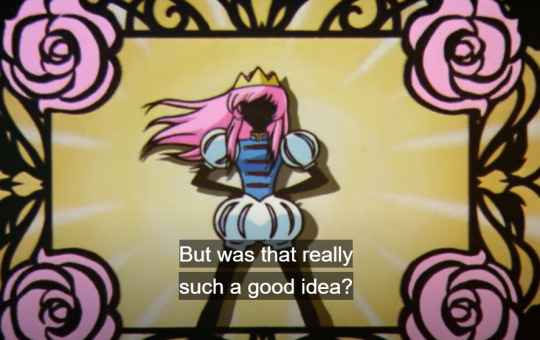
Or so the story goes.
Utena is blindly striding forward (and right off a cliff) like the fool card, and also like the fool she's on a journey to fill her emptiness and become whole. At the start of the story she's not a complete person. She's 14 to begin with, but also look at how she reacts when Anthy is stripped away from her at the end of the first arc and the "purpose" given to her is gone. She becomes depressed and barely responsive, and only stands up again to get that purpose back but she's still clinging onto someone else for purpose. Utena is like the fool, on a journey to become a complete person by gaining knowledge of the world.
That is what I would say separates the Hero's Journey from the Fool's Journey, the Fool's Journey is a Jungian narrative in nature. It's not about battling obstacles like in the Hero's Journey, but about the process of individuation. Individuation is the process by which an immature and fragmented psyche, and the experiences of a person's life, become integrated into a well-functioning whole. You can integrate your past memories, your shadow in a jungian sense, your subconscious, into a well-functioning whole.
Utena is not whole however by the time the Black Rose arc comes around, and her lack of awareness of this fact and of her own shadow is exactly what allows it to overtake her.
So we're following Jung here. Jung, Jung, Jung.
Jung and Tarot go hand in hand because Jung believed in archetypes, sets of symbols that were universal across all cultures, that appeared in both dreams and mythologies and were deeply meaningful to us on a subconscious level. The idea of prince and princesses in Utena are a Jungian Archetype. The Moon card Tarot also has major associations with Jung's idea of the subconscious.

PIctured is the full moon int he ngiht sky, positioned between two large towers. The moon is the symbol of dreams and the unconscious,it's light is dim comapred to the sun and only slightly illuminates the path to higher consciousness leading between the two towers.
In the foreground is a small pool, representing the watery, subconscious mind. A small crayfish crawls out of the pool, symbolizing the early stages of unconsciousness unfolding. A dog and wolf stand in a grassy field both howling at the moon, representing both the tamed and wild aspects of our mind.
The moon is a card heavily tied to Jung's idea of the subconscious, or the shadow. If the persona is our outer face to the world, what “what oneself as well as others thinks one is” [CW9 para 221], the “shadow is that hidden, repressed, for the most part inferior and guilt-laden personality whose ultimate ramifications reach back into the realm of our animal ancestors…If it has been believed hitherto that the human shadow was the source of evil, it can now be ascertained on closer investigation that the unconscious man, that is his shadow does not consist only of morally reprehensible tendencies, but also displays a number of good qualities, such as normal instincts, appropriate reactions, realistic insights, creative impulses etc “ [CW9 paras 422 & 423].
Jung believed in a separated consciousness, the conscious mind is the persona the light we can see and the shadow is the subconscious mind which consists of all that we are unaware of and/or is hiding in the dark, quite literally the shadow of our conscious minds.
In Fool's Journey the Moon Card is the stage at which the light is so dim that our shadows become the longest. When I say a Moon Arc in any kind of story, I mean a story arc where characters are essentially caught in the Moon Phase of the fool's journey, which is a special time of confusion and illusion.
Essentially, the Star which is the card preceeding it is the card of temporary inspiration. The star's light is what makes the fool vulnerable to the moon's illusions.
The light that illuminates this for him is The Star (17) which provides hope and a sense of renewal; this is the light at the end of the tunnel. The Fool feels inspired to start shining as his true self. However, its opposite – The Moon (18) – represents any fears and subconscious programming that may prevent him from enjoying this new state of bliss. Light casts a shadow and the shadow, in this case, is the old anxiety and fears which may rise to the surface when attempting to shine brightly as The Star.
The light of the star makes the fool vulnerable to the illusions of the moon. His positive emotions aren't subject to mental clarity. In his dreamy condition, the Fool is susceptible to fantasy, distortion and a false picture of truth.
So that is the moon arc in a nut-shell, an arc where a character gets too close to the light only to be trapped in shadows. How else can you describe the confusing Black Rose Arc but the characters themselves being trapped within a mage of illusions? Much like a dream the characters are trapped in, there's no sense of direction, time flows strangely, and the events of the entire arc are forgotten by the time the characters wake up.
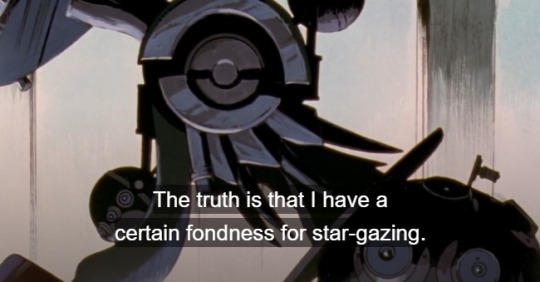
I'm not making up this Tarot symbolism either, in the first episode of the Black Rose Arc we are introduced to Akio, Anthy's older brother who likes to gaze up at stars in an indoor planetarium. A figure who gives advice to Utena all throughout the arc, but who is also clearly hiding another agenda and misleading her on purpose. The light of the stars leads to the illusions of the moon. He even discusses the moon with Utena in Episode 15.
Utena: Akio-san, you really think about your sister a lot, don't you?
Akio: Do I?
Utena: I probably wouldn't understand since I don't have any siblings myself,
Utena: ...but what does it mean for a girl to have an older brother?
Utena: What's this?
Utena: The moon?
Akio: Normally, it's something useless and of little concern.
Akio: But, every now and then, you look up at it and feel a certain degree of comfort
In this context he uses the moon as a metaphor for a sibling, someone who's always there but you don't usually notice them, but those words could describe the subconscious mind as well. Also, one final instance of star / moon symbolism within this arc the stars made by Akio's projector are fakes. The stars themselves are illusions.

The Back Rose Arc follows a formula to a T. Every episode a duelist comes to the Mikage Seminar for help (which is specifically a therapy seminar more Jung symbolism right there), they begin talking about their problems as an elevator descends down an elevator shaft and the voice listening urges them to go deeper.
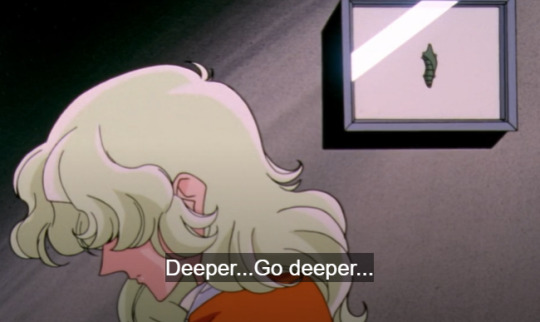
Utena later rides an elevator up to the dueling arena too, because the elevators are symbols for traveling to different areas of consciousness. The three levels, the dueling arena at the highest, the academy on the ground floor and the bottom of the elevator shaft era a metaphor for Freud's iceberg theory of consciusness which similarly divides the human mind into three levels.
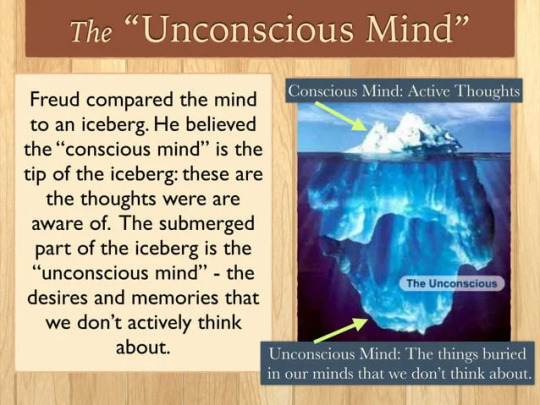
Not only are the characters physically descending down an elevator shaft, they are also plumbing the depths of their own unconscious minds and revealing to themselves what they have intenionally kept hidden and repressed by trying to bury it that deep.
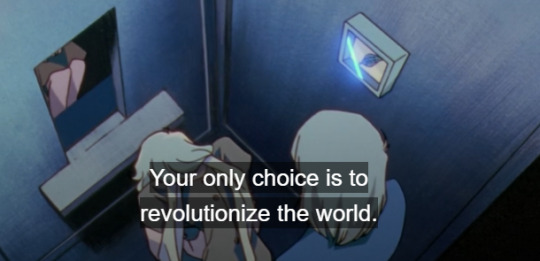
On the wall there's a specimen of a butterfly that slowly reverses its metamorphosis, from a butterfly, to chrysallis, to caterpillar, and then to a leaf with eggs on it. This too is a symbol of the unconscious, but this time of Jung, because Jung believed the unconscious mind was made up of our most primal instincts. The butterfly regresses to its infantile state while the characters in the elevator regress with it.
These characters become shadow possessed. In the story quite literally possessed as Mikage uses a black rose to turn them into duelist. However, Jung theorized that traits in our lives we repress or refuse to acknowledge are still there, they just come out in other ways.
“That which we do not bring to consciousness appears in our lives as fate.” (Carl Jung)
In the Curios Case of Dr. Jekyll and Mr. Hyde the good doctor Jekyll is a philantrophist who has lived a good life, but makes a potion to bring out his worst traits and transform himself into a hideous monster, so he can commit barbarous acts and get away with it. He just needs to drink the potion again and return to being Jekyll and all of his cruel acts will be blamed on Mr. Hyde. Over the course of the story the potion stops working and Jekyll can no longer drink a poition to neatly divide between his philanthropic good side, and his ugly bad side which robs and murders. He becomes Mr. Hyde all the time, his shadow gains dominance over him making him shadow possessed.
"With every day, and from both sides of my intelligence, the moral and the intellectual, I thus drew steadily nearer to that truth, by whose partial discovery I have been doomed to such a dreadful shipwreck: that man is not truly one, but truly two.” - Robert Louis Stevenson
Not only are the Black Rose Duelists possessed by their own shadows, the repressed qualities that are brought out in the Mikage Seminar's evil therapy session but they themselves also serve as shadows figuratively in story to the duelists they steal the sword from.
Kozue is the fixation of her brother the chaste and knightly Miki's madonna-whore complex, while Miki appears to be the most harmless of the boys he has an obsession with purity especially in his childhood days that he projects onto his sister and also any woman resembling his sister like Kozue.
Juri is the calm, cool, and collected female of the student council. Immediately seems like the most decent student council member. Just as looked up to by all the female students as Utena is. Until you find out she's a lovesick puppy reduced to a total emotional wreck over her unrequited love, unable to do little more than pine over her in secret. Then you meet the person she's in love with and her fixation on her friend Shiori just makes her look even more desperate.
Nanami is desperately attempting to stand in for her brother as the student council president, yet another one of the many ways she tries to earn his affection as his little sister. Nanami's desperately trying to recreate the closeness her and Toga had as children, but Toga's already left her behind for the world of adults, so now she's stuck trying to prove she can join him there when she's not even close as an incredibly high strung and spazzy thirteen year old who's more naive then even the younger student council members. She also has a kid tagalong who is three years younger than her, the same age gap between Nanami and her brother, who's also desperate to enter the same age group as her and be her equal but for the most part just gets treated like a pet or toy.
Kozue takes the sword from Miki, because Miki's issues revolve around his relationship with his sister which is a constant problem that plagues him in his life but something he chooses to ignore rather than address and fix.
Shiori takes the sword from Juri because she too is a shadow archetype, the object of Juri's affection but someone she doesn't talk to, or attempt to mend their relationship, and she especially doesn't seem to understand the real Shiori to the point where you wonder why Juri is so hung up on this person in particular. Is she even hung up on the real Shiori or is it just a fantasy because the real one falls far short of the romantic ideal that has Juri wandering the gardens at night and composing poetry like she's Lord Byron.
Mitsuru takes the sword from Nanami, because Nanami can't see the fact that the way she's treated by her brother, is ultiamtely the way she treats Mitsuru. No matter what Nanami does or how hard she tries to earn it, nothings going to close the gap between her and her brother and she can't force it the same way Mitsuru can't magically become thirteen.
Toga's is the hardest to fit into this category because he's not really around this arc and Keiko isn't much of a character, but it's interesting nonetheless one of Toga's many groupies is convinced of this cinderella like fantasy that Toga's evil sister is getting in the way of her true love with Toga and only if Nanami were out of the way Toga would be hers and hers alone. Just completely unaware of the way Toga treats women and just who Toga is in general. .
It could be a shadow archetype in two senses, one just the bright image of the prince has caused everyone even Toga himself to not notice who Toga really is as a person. They're too caught up in the romantic fantasy of Toga. Or maybe since Keiko taking the sword from Toga practically looks like she's assaulting him in a hospital bed, it could be showing the darker side of the way Toga views sexuality, that it's not necessary something he even likes or wants and has harmful connotations with him. Two it could just be another shadow archetpye for Nanami, there's really no becoming Toga's special girl. Toga's not really going to treat you any differently from everyone else, because he is for reasons completely emotionally unavailable.
Oh, while editing this post I realized I skipped Wakaba and Saionji. Very quickly Wakaba's relationship with Utena mirrors Saionji's with Toga, and Saionji similiarly wants to be someone important / a main character / special like Toga is because he believes it's the only way they can be equals. Wakaba's inferiority complex similiarly drives a wedge in the friendship between her and Utena. Wakaba also kind of uses Saionji as a rose bride of source to validate her feelings and make her feel special when he's relying on her for a place to sleep, whereas Saionji really only seems to want possession of Anthy and the Rose Bride to get one over on Toga so he won't have it.
Not only are the black rose duelists shadow possessed people, but the student council duelists have their swords stolen (symbols of agnecy, power, etc) by their shadow archetypes within the story. Other characters in the story who embody their repressed issues.
They confront their Mr. Hydes and then lose to them. They are temporarily made aware of the moons in their lives, which as Akio describes is someone normally useless of little concern but is always there nonetheless. He was using that to describe himself and Anthy, and by association Miki and Kozue but it applies to almost every duelist / black rose duelist pair, someone who is usually there but they take for granted, or ignore, or in Juri's case just don't want to confront. The Black Rose Arc forces a confrontation for each character with both their shadow, and their shadow archetype.
I could go list the similarities and differences with each set of character but I don't want to go on forever, so maybe in a post for another time. Instead I'm going to focus on the main one at the end of the arc and precisely why this arc is so important Nemuro Mikage, the shadow archetype to Utena.
In all mythologies there appears a trickster, a character which challenges the current ruling authority.
From mythology it is the character of the Trickster “…a collective shadow figure, a summation of all the inferior traits of character in individuals” [CW9 para 484], whom Jung thought could save us from ‘hubris’ and free the conscious mind from its fascination with evil. The trickster is usually thought of as atrocious, unconscious and unrelated, but someone who can nonetheless transform the meaningless into the meaningful. Often encountered at cross-roads, s/he is always moving, duplicitous, sexually rampant and a joker. The trickster is best portrayed, perhaps, by the figure of Hermes, who gave Pandora (‘the all-gifted one’) audacity and cunning.
From the shadows, and quite literally from nowhere appears Nemuro Mikage, a character who believes he can take the power of miracles for himself and also replace the Rose Bride by killing the original and making his partner Mamiya into the new Rose Bride. Can he even do that? How does that work? Who knows, this is Utena we don't explain anything.
The important part is Mikage is the manipulator who challenges the rules at Ohtori, and the established order attempting to subvert things. That's what Utena hates him the most for, being a person who willingly manipulated people who came to him with their issues, twisting them into thorny black roses to lash out at Anthy, and therefore Utena as well. Not only is Mikage made up of inferior character traits he's also an evil therapist who makes you act out on your worst impulses by bringing your worst insecurities to light.
Mikage's not just serving as the temporary trickster archetype however, he's also a shadow archetype of Utena made up of all of her inferior character traits. His name literally means "One's true nature"
根/Ne: lit. 3. “root (of all evil, etc), source, origin, cause, basis” or lit. 4. “one’s true nature” 室/Muro: lit. 1. “greenhouse, icehouse, cellar”.
Nemuro, like Utena is a duelist attempting to seize the rose bride and the power of miracles / eternity / the shining thing for the sake of someone else rather than themselves. They do so because saving Anthy / saving Mamiya gives them purpose.

Nemuro, like Utena is someone who doesn't have friends or family or any connection to the world but suddenly becomes involved in another family consisting of a brother and a sister. He becomes obsessed with the idea of them as a family of three because it fixes the lack of love or connection to other people that is missing in their lives.
Utena becomes obsessed with the idea of playing house with Anthy and Akio, to the point where she completely ignores the true nature of Akio and Anthy's relationship and misses very obvious warning signs. She sees them as a trio especially after moving in with them the next arc. Utena even urges Akio to get in the picture he's taking to commemorate her and Anthy's friendship.
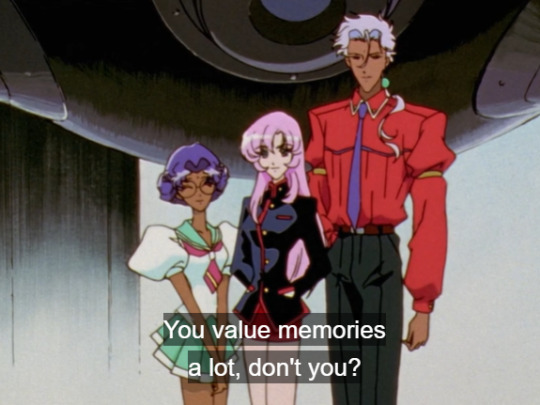
Nemuro also believes he is in love with the older sister, an adult (Nemuro is a child, a child genius but a child nonetheless) but also experiences queer subtext with the younger brother. Nemuro fawns over Tokiko like she is some lost love and makes her the central figure of her motivations, but it's Mamiya he hallucinates actively as being his companion and flirts with when it's Anthy pretending to be him.
Utena is obsessed with a prince from her past driving her actions who is actually Akio, but who she's memorialized in her mind the same way that Nemuro memorialized Tokiko. She also believes there's a relationship between her and the older brother Akio, but that relationship isn't real because she is a child and Akio is an adult. Meanwhile she also experiences the same queer relationship between herself and Anthy who like Mamiya and Nemuro are actuall the same age.
Utena and Anthy's relationship also mirrors Mamiya and Nemuro in that Nemuro's main motivation is to give Mamiya eternity to cure his sickness, something Mamiya has said he doesn't want.
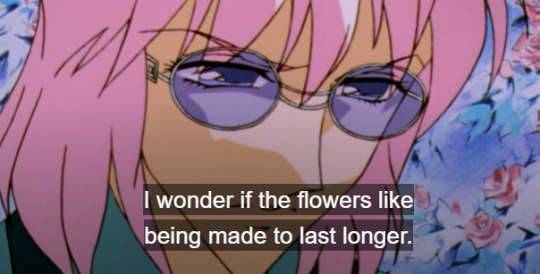
Nothing in this world is eternal, although a heart that longs for eternity could be considered beautiful.
Utena is also attempting to use the duels to protect Anthy, something Anthy never asked for her to do, and something that is actually just Utena selfishly using Anthy to give her some sense of purpose in life.
Nemuro and Utena both imagine themselves as main characters in a narrative, fighting for the sake of their loved ones, and at the end of their hero's journey they will be rewarded with everything they've fought so hard to earn. They're creating stories of their lives and making a narrative to give themselves a reason to keep going after death. For Utena it's a symbolic death, the feeling she should have died alongside her parents. For Nemuro it's his likely literal death, as apparently the Nemuro Memorial Hall and everyone inside died fifty years ago and Mikage has been stagnating for fifty years as a ghost in Ohtori unable to remember the fact that the Mikage hall burning is the long past and he hasn't changed in all this time. They are figuratively and literally dead, and in need of a reason to keep living create a story where they are the main characters.
They also imagine themselves as noble, selfless heroes sacrificing for the sake of their loved ones. Yes, even Mikage when he's playing the villain role of evil therapist and messing with people's minds he's still talking about it as some great heroic sacrifice on his part. It's a bit extreme yes but it's to point out how ridiculous Utena's own hero complex about her duels over Anthy is, especially in Anthy's mind. Nemuro burns down a hall and declares himself a hero for doing so. Utena gets in swordfights behind the school gym class and declares herself a hero. Neither Mamiya nor Anthy ever asked for them to do this, in fact when Anthy starts to genuinely like Utena she asks for the opposite for Utena to run and save herself it's just they decide to do these things on their own while imaining it as some great sacrifice on their parts.
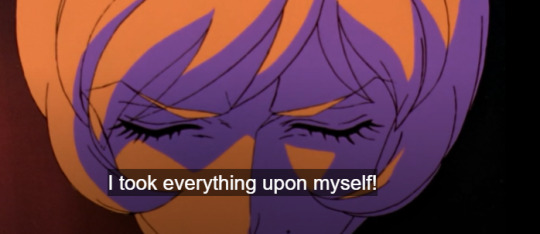
Even your brother's crime!
Souji... Come and see now?
Back then, in that place who was there. Who wasn't there? Who was it that really set that fire?
Mikage makes it like he's a hero who took the heat for Mamiya's crime of burning down the hall when really he's the one who burned down the hall, and he simply blamed Mamiya for it in his memories.
Everything Mikage is fighting for is based upon unreliable memories, lies, and illusions because you know moon arc.
Anthy openly mocks him for his misguided notion and his hero complex that he's doing this to save someone, by unraveling the memories he thought was guiding him right in front of his eyes, sabotaging him in his fight against Utena.
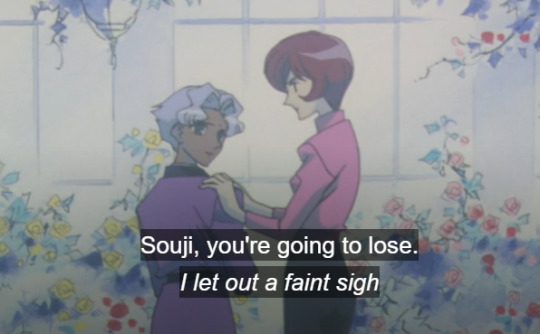
Souji, you're going to lose.
Mamiya!
She will scatter the rose you wear.
What? Where are you? Mamiya! Mamiya!
What the? Who's?
You can't beat her.
You will never beat my sister who dwells in your memories.
We see this exact same thing happening when it's time for Utena to fight Akio, just when she's about to win Anthy sabotages the fight, mocks her for playing hero and says it's impossible for her to have ever won against her older brother Akio. The way Nemuro cries out Mamiya's name in pain and confusion before realizing Mamiya has been dead for years and the person he's been talking to all this time wasn't the real one, even mirrors Utena calling out Anthy's name in desperation as she realizes she never once understood the true Anthy.

Akio calls Nemuro to tell him shortly afterwards that he was using his unreliable memory of the past in order to further his agenda at this school.
Akio: I exploited the illusion you cherished in your memory so much that you even halted your own time.
Akio: The period where you hid the possibility in your heart, not growing up, was useful.
Akio similiarly takes advantage of Utena's vague memory of the prince within her heart, in order to manipulate her into the dueling games even perfectly playing her prince later on to both lead her on by the nose and try to poison her relationship with Anthy.
Which is the greatest connecting thread between Utena and Nemuro. They both are creating fiction in their heads by imagining themselves as heroes in a storybook, and they have both built their entire motivations out of unreliable memories. The foundation they are standing on is a misremembered past. A past they've made into beautiful stories in their own minds.
Mikage: You sound like you're yelling out, "Don't touch my precious memory!"
Utena: What did you say?!
Utena: Don't even talk like you understand me!
Utena: My memory is...
Mikage: I see. It's that memory that's been supporting you up until now.
Mikage: No need to be ashamed.
Mikage: Because the memory you possess is a worthy one.
Mikage: Only those with beautiful memories are allowed to wish,
Mikage: "If only those days could last forever, if only I could still be what I was back then."
Mikage: I know that you're the same as myself.
Mikage: Your eyes are like those people who can't help wanting to make memories last forever.
What is a story but a lie? A fiction? The lies they are told by tohers and the lies they tell themselves are what manipulate them into going forward, straight off of that cliff. After all is there any character with less agency over themselves than the main character of a story? A character in a story doesn't have any free will after all they just go where the author tells them to go, and do what the author writes for them. However, to Mikage and Utena that doesn't even seem to matter because they're both so desperate they need something, even something they subsconciously know is a lie or doubt themselves to keep moving forward. If they don't even have that, then they're dead.
Mikage: I knew since the first time I saw you.
Mikage: You met the person important to you long ago, right?
Mikage: And so, that person changed your life forever, right?
Mikage: You're standing here on the strength of that illusion.
Mikage: That's why you were able to enter the Duel Arena.
Mikage: Am I wrong?
Mikage: After all, you're just like me.
The fools who are the heroes of their own stories, and characters in Akio's stageplay just keep moving forward until they walk off that cliff. They try to be storybook heroes from beginning to end, unable to see the problem in that until it's too late. Mikage represents Utena's own journey through the labyrinth of illusions that is the moon and what's waiting for her at the end.
The Black Rose arc foreshadows exactly what happens to Utena at the end of the story. Nemuro graduates from the academy, disappears, and all trace of him is gone and people quickly forget about him.
Akio: However, that's all over.
Akio: From now on, the path before you is not prepared.
Akio: You, graduate now.
Utena: Oh, darn it.
Utena: What a weird place we ended up in while searching for Himemiya.
Miki: There was a really big fire here a long time ago.
Utena: Really? So there really was that kind of trouble.
Miki: It seems there weren't any casualties, but since it was before the time of the Student Council, no records remain.
Miki: Let's see... What was the building called? Kushiro Memorial Hall...
Miki: Sounds wrong. Noboribetsu Memorial Hall? Argh! I hate it when I can't remember!
Utena similiarly leaves the academy and Akio comments that just like Nemuro she'll fade quikcly from people's minds.
Akio: It hasn't been that long since then, but everybody's forgotten about her completely.
Akio: She didn't cause a Revolution after all.
Akio: Now that she's gone, she was just a dropout to this world.
They also reach their tragic end for similiar reasons, they couldn't stop playing the role of the hero until the very end.

It's pretty much spelling out to us how the series is going to end in the second arc. Utena / Nemuro are brought into the dueling games on a false memory that's manipulated by Akio to give them a reason to participate. In their final duel, they're betrayed by Anthy and sabotaged in the middle of their fight causing them to lose. Afterwards they struggle against the truth. The result of them learning the truth is them being exiled from Ohtori Academy forever, and they are unable to save the person they want to save by playing prince, Mamiya was never alive, and Utena never got to know the true Anthy. All because they decided to play storybook prince in the first place rather than look at the reality.
Utena's however, ends on a much more hopeful note. As she's at least escaped the fiction of Ohtori Academy and Anthy insists that she is still there somewhere out in the real world. Just like the world in Tarot is the last card of the Fool's Journey, where as a whole person the Fool is now ready to join the rest of the world.
However, the Black Rose arc doesn't just foreshadow the ending of the story perfectly with Mikage's ending, it also is just the nature of the moon tarot card itself. People call it fillerly because there doesn't seem to be any real substantive change to the story, but illusions are illusions they're not supposed to be substantive. The characters don't change after the confrontation with their shadow selves.
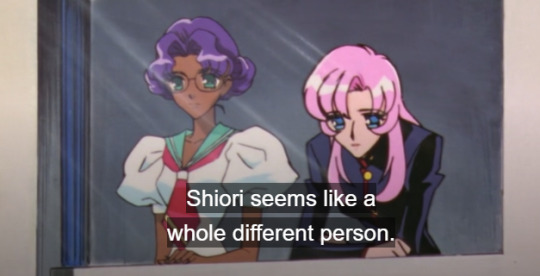
You think so?
Huh but she's.
She hasn't changed. Not a bit.
Number one there's no real end in the conflict between the shadow and the conscious mind and number two that's what happens with dreams they fade in the daytime and are forgotten when you wake up.
That's the moon in general too. Always there for you. You don't usually think about it and it doesn't serve any real purpose, but from time to time you look up at it... and it makes you feel better.
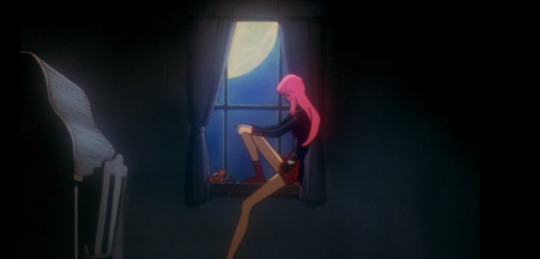
#askspookies#rgu meta#revolutionary girl utena#utena tenjou#nemuro mikage#akio ohtori#anthy himemiya
150 notes
·
View notes
Text

Just one more and it's like we can commit arson on an elevator building twice
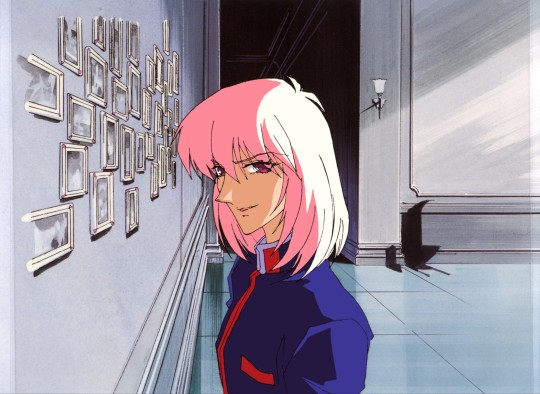
160 notes
·
View notes
Text

(the monster is in the mirror)
[original comic by @asoftersea]
#a softer world#revolutionary girl utena#shoujo kakumei utena#a softer world remix#rguedit#souji mikage#mamiya chida#mikage and mamiya#a softer sea remix#7 2023#professor nemuro
106 notes
·
View notes
Text
Rewatching the end of the Black Rose Arc always makes me go insane. What do you mean after we see the flashback of Mamiya burning down the building and Tokiko asking him if it's his doing he answers "Yes" without emotion, and then right after this we see Mamiya talking to Mikage who replies "Yes" in the exact same way over and over again. What do you mean we hear the 100 duelists talking about how Mikage's job will soon be over and they'll "carry on without him". What do you mean after Mikage loses to Utena Akio asks Anthy "Do you feel sympathy for him?" ("Are you having regrets?") THIS SHOW MAN. THIS SHOW.
#*takes a deep breath* FORESHADOWING IS A LITERARY DEVICE THAT-#rgu#revolutionary girl utena#souji mikage#nemuro tag#moje
78 notes
·
View notes
Text

every human exigency crackles as he plugs it in
every outlet works but one
death stays dark
54 notes
·
View notes
Text

01x23 qualifications of a duelist
#utena#revolutionary girl utena#rgu#shoujo kakumei utena#sku#souji mikage#mikage souji#professor nemuro
12 notes
·
View notes
Text
So I was thinking about my Mikage/Nemuro name analysis again, but specifically the Nemuro one. Quoting from my old post:
根/Ne: lit. 3. “root (of all evil, etc), source, origin, cause, basis”
or lit. 4. “one’s true nature”
室/Muro: lit. 1. “greenhouse, icehouse, cellar”.
So Nemuro could mean literally “the greenhouse of one’s true nature” or “greenhouse origin” etc.
Nemuro met Mamiya in the greenhouse, yadda yadda, he was gay his true nature is gay. BUT!!! I only just now made the connection that Utena literally sees Anthy for the first time (that she can remember) in the greenhouse! Right after she sees her, she says:
“Why does the scent of roses always make me think of the past?” - Ep.1
Utena’s true nature, her real origins, the cause and basis for everything: Anthy.
#rgu#rgu meta#utena is not beating the mikage allegations#also the meaning the name has is purposeful bc mikage souji also has a very purposeful meaning; mikage is lit. spirit of the dead#dictionary definitions on based on how the kanji is read: ne + muro#the giant finger pointing towards the inside of the greenhouse in ep22 with tokiko and mamiya inside#also before anyone says anything since its not common knowledge; nemuro wasnt an adult#source: early ep.22#i wish more people wrote about the mikage episodes i feel like theyre so important for utena/anthy/akio analysis#.txt
25 notes
·
View notes
Text
I’ve posted this before, but if any of y’all like Souji as much as I, I think you’ll like this playlist. It’s a chronological playlist that follows the progression of his character
6 notes
·
View notes
Text
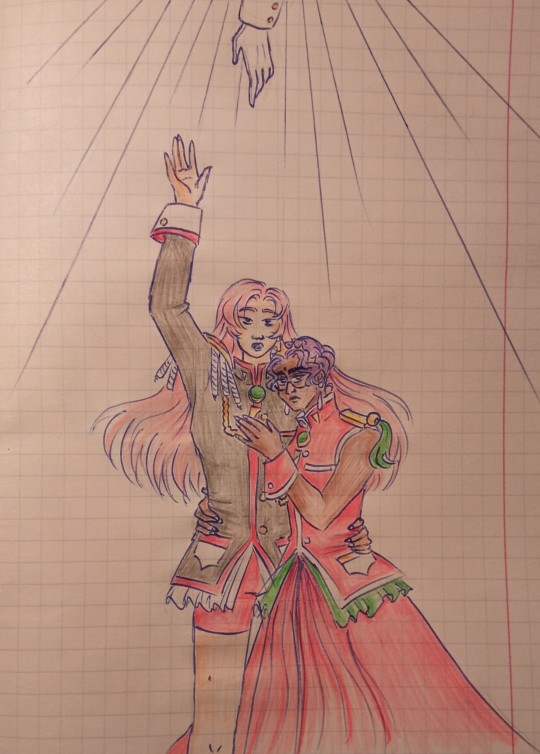

I knew since the first time I saw you.
You met the person important to you long ago, right?
And so, that person changed your life forever, right?
After all, you're just like me.
I had to draw this cause the parallels between Dios/Utena/Anthy and Tokiko/Mikage/Mamiya wouldn't let me sleep in peace
#utenadoodles#utena tenjou#anthy himemiya#dios#souji mikage#professor nemuro#mamiya chida#tokiko chida#help I am once again having ideas beyond my skill level#well I tried my best
9 notes
·
View notes
Text
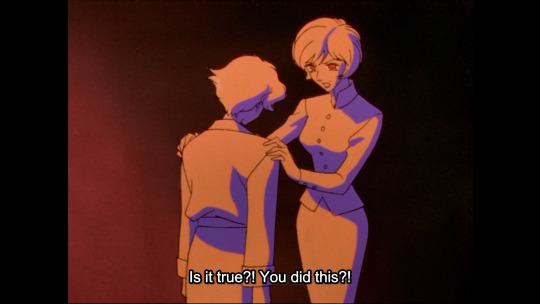

It was Mamiya and not Mikage?
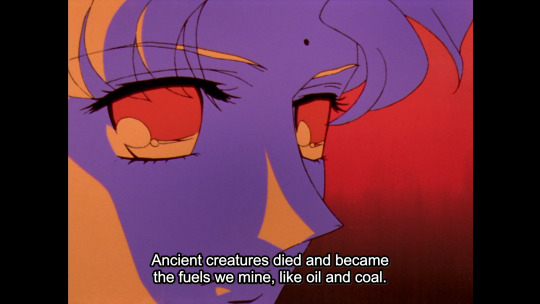


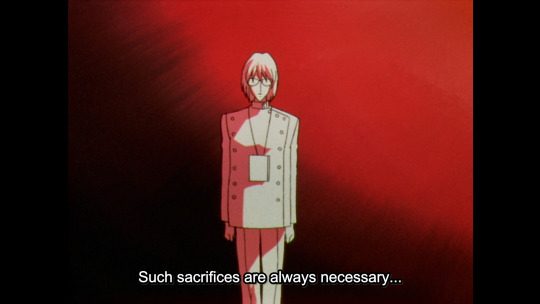
So does this mean that Mikage manipulated Mamiya into doing what he wanted?
3 notes
·
View notes
Text
some thoughts on photography and memory in utena:

on the wall in nemuro memorial hall, there are pictures of real people. i'm not sure who they are, but i assume they're of people involved in making the show. either way, they're obviously not real; in the close-up shots of them, they change into pictures of the black rose duelists and other imagery from the show. i imagine it's there as a fun detail by the creators, but also to show how weird and inconsistent reality itself is in the black rose arc.
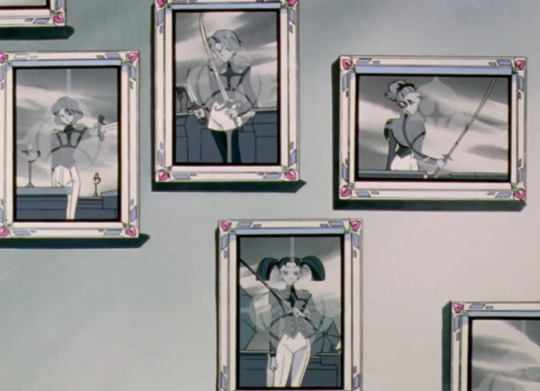
as for the black rose duel images themselves, it's possible that they are literal as i've talked about in a previous post, but what i think is more likely, is that utena noticing them is a visual representation of her connecting the dots of what's really been going on in this arc.
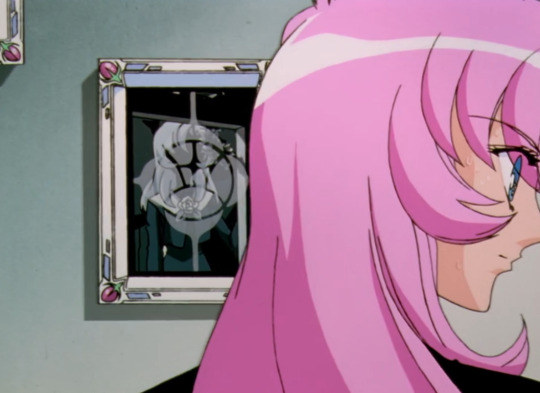
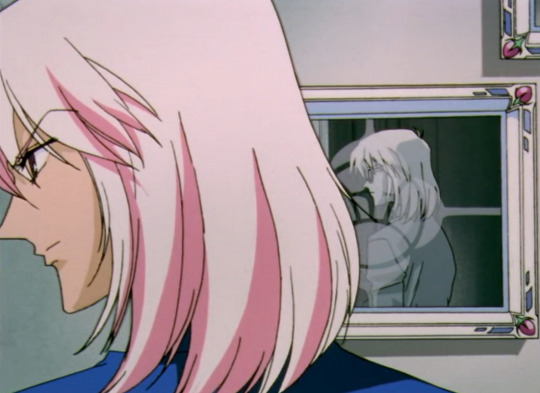
when mikage brings up the idea of memories and eternity, we see the picture on the wall behind utena, of her at her parents funeral. and behind mikage we see one of his own defining memories.
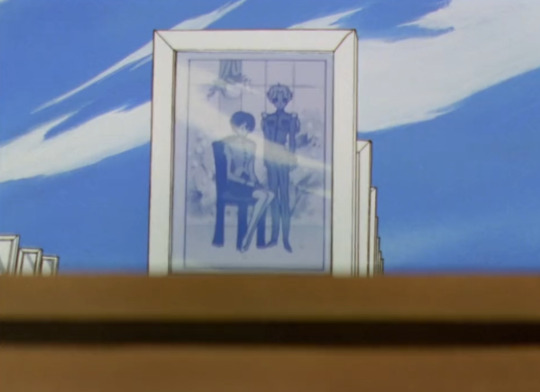
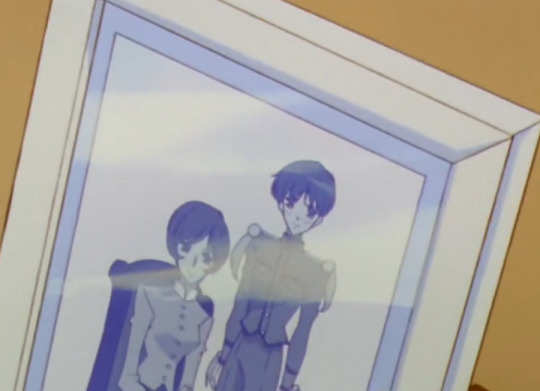
a pretty clear line is being drawn between memory and photographs. in fact, memories are so important to mikage that photographs are his black rose duel symbol. it's the one he keeps of mamiya and tokiko, altered to look like anthy's disguise, just like his memories are. through mikage we see both how memories of the past can keep you trapped in it, as well as the malleability of these memories. let's look at everybody else:
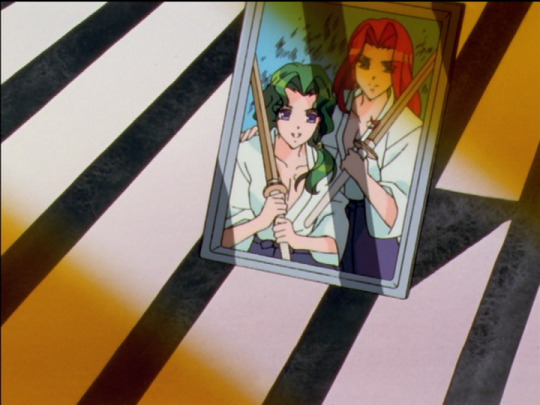
saionji has a framed photograph of him and touga as kids on his desk. he values their friendship, or at least the memory of how it used to be. he idealizes the time touga was less cruel (or maybe just the time saionji wasn't aware of his cruelty.)
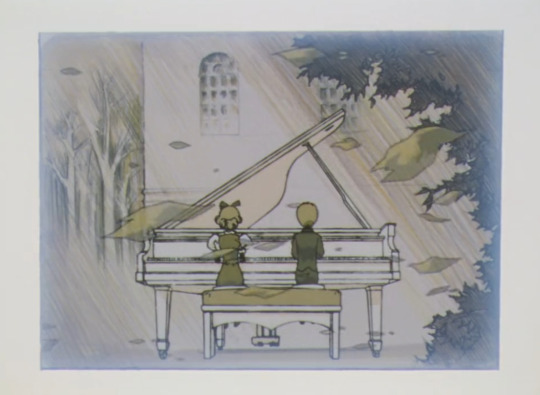
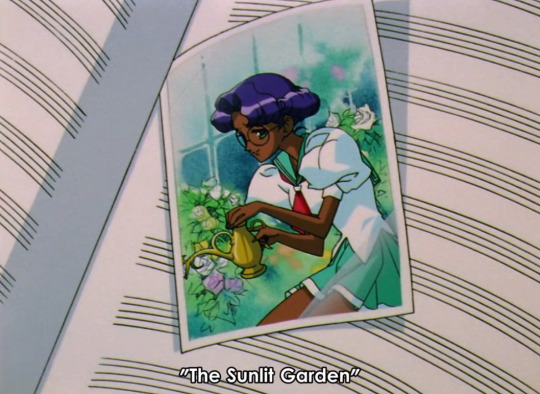
miki doesn't have any literal photographs of kozue or the sunlit garden, though his memories of them are often framed as such. he also keeps a picture of anthy amidst his sheet music. she is his idealized memory now.
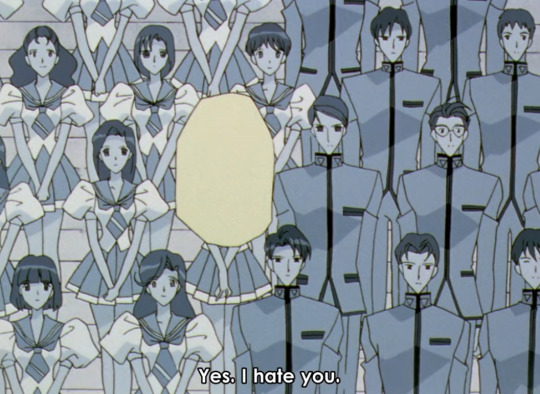
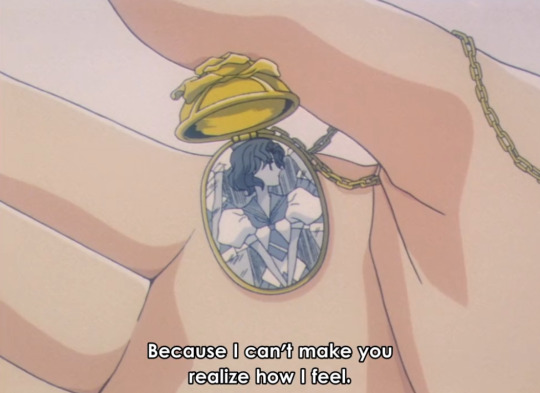
juri has the locket of course, inside of which is a cutout of shiori from a picture captured in the moment that ends up defining their entire relationship. is this the version of shiori that juri idealizes? not really, but she is fixated on her resentment of shiori's percieved cruelty, just not the cruelty of taking the boy away. juri keeps this photograph closer than anybody else does with theirs, but she also keeps it hidden. this could mean she treasures her memories the most out of everyone, and is also the least open about it, although i'm not sure i believe the first part.

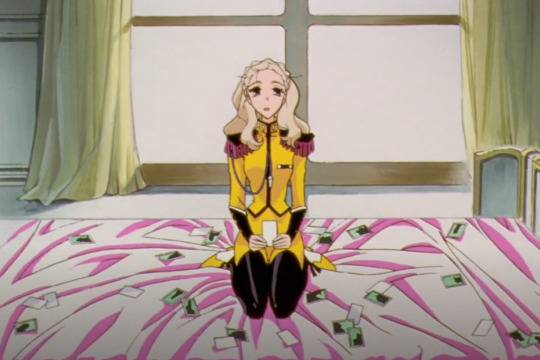
nanami has the photo-album of her and touga; she idealizes her relationship with him, as well as their childhood. when she makes the connection that touga is adopted, the photos are scattered all over her bed, probably to represent her emotional state.
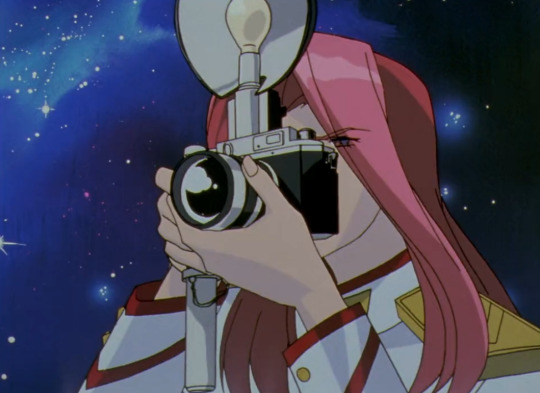
touga doesn't keep any photographs from what we see, which makes sense with everything we know about him. unlike the rest of the council, he doesn't have any idealized memories of his childhood. but he does use akio's camera, so let's talk about that.
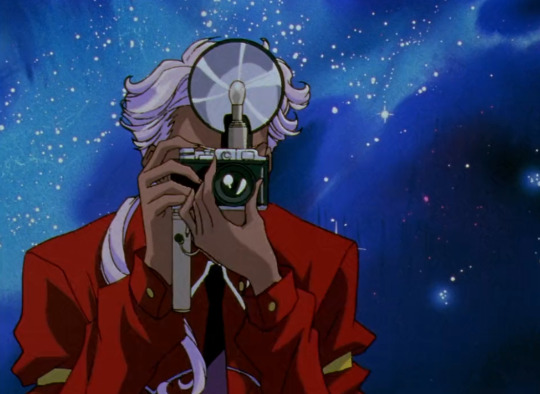
the camera is, much like the car, a tool that only akio is shown to own (although, wakaba does mention a photography club in episode 34.) like the car, it is used to facilitate his grooming (specifically of touga and saionji when he takes those shirtless pictures with them.) and, also like the car, he offers to lend it to touga, to make him feel more like an equal part of the whole thing. unlike the car though, touga accepts the camera.
the photoshoot scene in episode 37 has a transition where the camera shutter sound effect is played over the previous scene. over the shot of utena and anthy holding hands after confiding in each other about akio. i think it's to show that he's always watching, and that they can never truly be free of him as long as they're in ohtori.
i think it also shows the idea of akio framing the narrative of the show as a whole. he plays a sort of director role in it, in that he directs the events happening, as well as how they're portrayed. it's no coincidence that he is quite literally behind the "camera" in episode 33. like the car, a symbol of akio's power and sexual abuse (which is not-coincidentally also present in all of the photoshoot scenes,) his camera (his narrative, his biased framing of events) is ever-present.
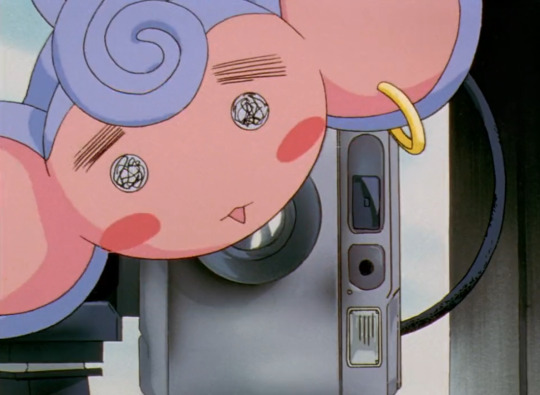

and then there's the most important photograph in the show, the frame it all ends on. the picture utena and anthy took together is, unlike every other photograph, used as a look into their future. the reason they take it in the first place is because utena realizes she has no photos of anthy, which distresses her, presumably because she worries that their friendship might not last forever, and she wants something to remember anthy by. this obviously comes with the risk of making anthy an idealized memory, like every other person put in a photograph in this show, but instead it ends up as a symbol for their love. akio may have set up the camera, but anthy (with the help of chu-chu) manipulated their positions so her and utena could hold hands. she also cuts akio out of the frame, much like she cuts him out of her life in the last episode. she doesn't want his presence to tarnish her and utena's memory anymore (although he isn't completely gone from the photograph either, as he will never truly be forgotten.)
#id in alt text#finally finished this post#these are not the only photographs in the show just the ones linked closest to the themes i wanted to discuss here#revolutionary girl utena#analysis#utena#mikage#saionji#miki#juri#nanami#touga#akio#anthy#m#the narrative
620 notes
·
View notes
Text
rewatching utena for the first time in about a decade and it is truly the funniest show ever.
we just finished the black rose arc, the last ep was truly a mindfuck. mikage completely succumbing to his delusions and unable to tell memory from reality, finding out he's been frozen in time for decades, mamiya has been dead all this time and anthy was pretending to be him. mikage is defeated and expelled/set free from ohtori, the existence of his life and of nemuro memorial hall wiped from everyone's memory.
then the following episode is a recap. and maybe you're thinking, whew, this arc was a doozy, it'd be nice to have it broken down into a nice, digestible 20 minute episode that'll really help me understand and process things! AND THEN THE ENTIRE RECAP EPISODE IS ABOUT NANAMI AND HER GOOFY SHENANIGANS OH MY GOD.
'wait so what's real and what isn't, how long was mikage trapped there was anthy the one orchestrating this all along--' 'HEY REMEMBER WHEN NANAMI WAS BEING CHASED BY SURFING ELEPHANTS IN INDIA???' it is so POINTEDLY and MALICIOUSLY unhelpful, it is truly the most king shit I've ever seen. it's broadcasting the clearest message possible that if you went into rgu expecting it to explain anything to you, it's not gonna happen. you are getting elephants instead. fuck you.
(this post was brought to you by @not-the-blue who is watching the show with me for the first time and has no idea what's going on, i just turned her frustrated-amused rant into a post❤️)
#utena#revolutionary girl utena#text#my rambles#well technically not-the-blue's rambles y'know.#utena spoilers#meta
541 notes
·
View notes
Text

#utena tenjou#nanami kiryuu#juri arisugawa#wakaba shinohara#kyouichi saionji#professor nemuro#souji mikage#revolutionary girl utena#rgu#rgu merch#shojo kakumei utena#utena merch#sku#shoujo kakumei utena#stickers
79 notes
·
View notes
Text
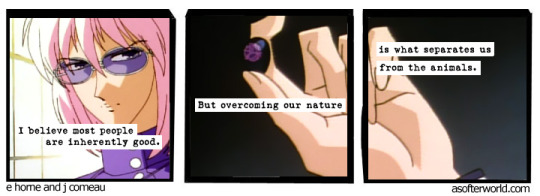
(Take control.)
happy birthday, mikage.
#a softer world#revolutionary girl utena#shoujo kakumei utena#a softer world remix#rguedit#professor nemuro#souji mikage#asw 733#12 2022
75 notes
·
View notes
Text


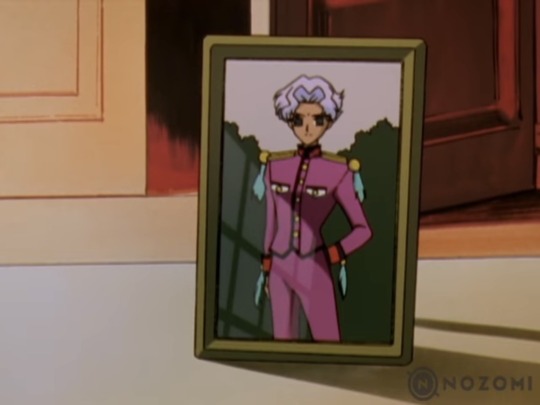

Thinking thoughts...
#idk there's just something about gay people and photographs in utena#something something preserving a dear memory... something something freezing your adolescence in time.. obtaining eternity....#just. photographs in general. there's SOMETHING#utena mikage and juri get bonus points for specifically cropping out everyone else out of the picture#it all feels so personal and intimate#rgu#revolutionary girl utena#nemuro tag#moje
128 notes
·
View notes
Text

01x22 nemuro memorial hall
#utena#revolutionary girl utena#rgu#shoujo kakumei utena#sku#mikage#souji mikage#mikage souji#nemuro#professor nemuro
49 notes
·
View notes